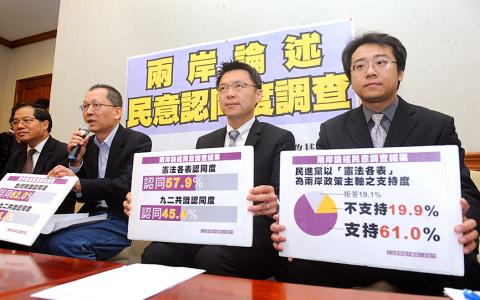An opinion poll released yesterday showed that former premier Frank Hsieh’s (謝長廷) initiative of “two constitutions, different interpretations (憲法各表)” has stronger support than the so-called “1992 consensus” advocated by the Chinese Nationalist Party (KMT) and Beijing.
While 57.9 percent of the respondents said they supported Hsieh’s proposal, 45.4 percent of those polled supported the “1992 consensus,” Harbor Cities Exchange Foundation executive director Chan Chao-tsung (詹昭聰) said at a press conference in Taipei.
Hsieh’s proposal has bipartisan support, winning recognition from 60.9 percent of those who identified as pan-green supporters and 70.9 percent of pan-blue supporters.

Photo: Liao Chen-huei, Taipei Times
“The results show that [Hsieh’s initiative] has the potential to become the consensus of the Taiwanese people,” said Democratic Progressive Party (DPP) Legislator Chao Tien-lin (趙天麟), who is close to Hsieh, adding that the initiative could become “version 2.0 of Taiwan’s China policy.”
The poll found that 61 percent of respondents supported Hsieh’s proposal becoming the DPP’s formal China policy, including 84.9 percent of pan-green supporters.
Chao said “two constitutions, different interpretations” was favored over the 1992 consensus, which was relatively unpopular among the 20 to 39 age group and in the south, because of its pragmatism and was seen as being better than the DPP’s past proposal of “name rectification and new constitution,” which many dubbed as provocative.
The poll, conducted between Thursday last week and Sunday, collected 1,071 valid samples and had a margin of error of 3.01 percentage points.
Decreasing support rates for the 1992 consensus showed the public’s disappointment with and suspicion of President Ma Ying-jeou’s (馬英九) cross-strait policies, National Sun Yat-sen University professor Lin Wen-cheng (林文程) said.
“Ma should take note of his disconnection from mainstream public opinion,” Lin said.
Responding to the survey, Hsieh said at a separate setting yesterday that he was glad the initiative has won majority support.
“I’ve been criticized a lot over the initiative, but the results show that it has the support of 61 percent of Taiwanese, with Washington viewing it acceptable and Beijing seeing it as tolerable,” Hsieh said.

The Ministry of Education (MOE) is to launch a new program to encourage international students to stay in Taiwan and explore job opportunities here after graduation, Deputy Minister of Education Yeh Ping-cheng (葉丙成) said on Friday. The government would provide full scholarships for international students to further their studies for two years in Taiwan, so those who want to pursue a master’s degree can consider applying for the program, he said. The fields included are science, technology, engineering, mathematics, semiconductors and finance, Yeh added. The program, called “Intense 2+2,” would also assist international students who completed the two years of further studies in

Former president Tsai Ing-wen (蔡英文) departed for Europe on Friday night, with planned stops in Lithuania and Denmark. Tsai arrived at Taiwan Taoyuan International Airport on Friday night, but did not speak to reporters before departing. Tsai wrote on social media later that the purpose of the trip was to reaffirm the commitment of Taiwanese to working with democratic allies to promote regional security and stability, upholding freedom and democracy, and defending their homeland. She also expressed hope that through joint efforts, Taiwan and Europe would continue to be partners building up economic resilience on the global stage. The former president was to first

Taiwan will now have four additional national holidays after the Legislative Yuan passed an amendment today, which also made Labor Day a national holiday for all sectors. The Chinese Nationalist Party (KMT) and Taiwan People’s Party (TPP) used their majority in the Legislative Yuan to pass the amendment to the Act on Implementing Memorial Days and State Holidays (紀念日及節日實施辦法), which the parties jointly proposed, in its third and final reading today. The legislature passed the bill to amend the act, which is currently enforced administratively, raising it to the legal level. The new legislation recognizes Confucius’ birthday on Sept. 28, the

Former president Tsai Ing-wen (蔡英文) on Monday called for greater cooperation between Taiwan, Lithuania and the EU to counter threats to information security, including attacks on undersea cables and other critical infrastructure. In a speech at Vilnius University in the Lithuanian capital, Tsai highlighted recent incidents in which vital undersea cables — essential for cross-border data transmission — were severed in the Taiwan Strait and the Baltic Sea over the past year. Taiwanese authorities suspect Chinese sabotage in the incidents near Taiwan’s waters, while EU leaders have said Russia is the likely culprit behind similar breaches in the Baltic. “Taiwan and our European